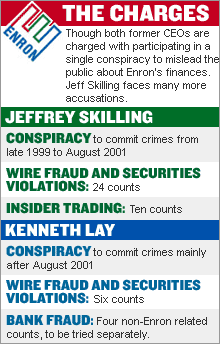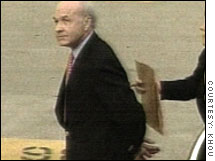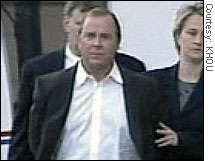|
Judgment day
Ken Lay and Jeffrey Skilling are called to account. Here's how Enron's house of cards fell apart.
NEW YORK (FORTUNE) - They stand together against the world: the poster boys of corporate malfeasance, the yin-and-yang former CEOs of Enron finally coming to trial in a drab federal courtroom in downtown Houston. But in truth, Ken Lay and Jeff Skilling never much cared for one another. The charming Lay wasn't comfortable with Skilling's sharp edges; the brainy Skilling considered Lay a lightweight glad-hander. And each has, at various points, sought to cast some measure of blame on the other for the 2001 bankruptcy of what was once the seventh-largest company in America -- an implosion that wiped out 4,500 jobs and $70 billion of investors' money while Lay, Skilling, and other top executives walked away with hundreds of millions of dollars.
Since that time, a SWAT team of prosecutors, FBI agents, and other experts have been trying to answer the question, Whose fault was it? So far they have charged 34 defendants and obtained 16 guilty pleas -- including those from several key former Enron executives. But all that was prelude to the trial of Lay, 63, and Skilling, 52, which is set to begin on Jan. 30. The two men who were never friends are now locked together in deep mutual need -- if convicted, the pair, once widely acclaimed as visionaries, could spend the rest of their lives behind bars. The trial, which may last into the summer, will be a critical event in American business history. The investigation has been the most exhaustive examination of a corporate crime scene ever conducted, and it is Enron -- not Tyco, not WorldCom, not Martha Stewart -- that has come to stand as shorthand for everything that went wrong in corporate America. The verdict will send a clear message about the accountability -- or lack thereof -- of those at the very top of a company. With only a modicum of hyperbole, Skilling's lead lawyer, Daniel Petrocelli, calls the impending showdown the "most important, most high-profile, most must-win case that [the U.S. government] has ever prosecuted." For Lay and Skilling, there is even more at stake than guilt or innocence. They are seeking not just acquittal but public redemption. In most criminal trials the prosecution and defense have divergent views of reality, but in this case the difference is extreme: Lay and Skilling will argue not just that they weren't hiding anything, but that there was nothing to hide. In an extraordinary speech last month, Lay declared that Enron was a "strong, profitable, growing company"--a "great company"--even into the fourth quarter of 2001. Enron, the two men say, was brought down by the actions of a rogue officer--former CFO Andrew Fastow, who has already pleaded guilty. The trial will also be a fitting finale to the Enron saga, because in the end, the whole story is about betrayal. There is, of course, Enron's betrayal of its investors, employees and customers. But there will also be the spectacle of former executives, once united behind a smooth corporate facade, turning against one another. Already, onetime friends have accused one another of lies and deception, and people's versions of the truth have proved to be surprisingly malleable. Take Rick Causey, Enron's former chief accounting officer who, as a co-defendant with Lay and Skilling, long swore to one version of reality and then -- with a shocking, last-minute guilty plea just after Christmas -- suddenly swore to quite another one. Parts of the trial will doubtless be painfully dull, since much of the evidence will concern technical accounting issues. But it will be suspenseful right to the end, because convictions in white-collar criminal cases can be surprisingly hard to obtain. With Lay and Skilling's high-priced legal talent, the complexity of Enron, and the mixed results in the criminal trials to date, there will be plenty of Twilight Zone moments when it will be hard to know what to think. So it may be helpful to recall, on the eve of the trial, four pivotal events that brought us to this bleak crossroads in American business: AUG. 14, 2001 Skilling takes a hike
The beginning of the end at Enron actually dates back almost four months before the company's bankruptcy filing -- to the day when Jeff Skilling publicly announced he was quitting as CEO. For many people, both inside and outside Enron, that was when it became clear something was seriously wrong. Enron's stock fell 6 percent the next day, to $40.25. It would never close that high again. (Read more.) OCT. 24, 2001 Fastow becomes the enemy
To Ken Lay and Jeff Skilling, Enron's CFO wasn't always the bad guy. Indeed, Andrew Fastow was a longtime Skilling protege, and Lay had always viewed him as indispensable. After Lay became CEO again, one of his early moves was to negotiate a lucrative extension of Fastow's contract, and Lay defended Fastow in an October 23 conference call, saying "I and the board of directors continue to have the highest faith and confidence in Andy." The next day, Fastow was gone, and Lay has recently claimed that the CFO's larcenous behavior sank the company. (Read more.) JULY 30, 2004 Ken Rice breaks ranks
Among the 77 people on the list of potential witnesses for the prosecution, no one was closer to Jeff Skilling than Kenneth Duane Rice. Rice's role as CEO of Enron's broadband business, perhaps Enron's most brazen illusion, placed him onstage in the investigation of Enron. In May 2003, Rice was among seven broadband executives charged in a 218-count criminal indictment. For a year, Rice swore he'd done nothing wrong. Then, on July 30, 2004, Rice cut his deal. He later testified that it was at Skilling's urging that he lied about the state of Enron's broadband network. (Read more.) DEC. 28, 2005 The "Pillsbury Doughboy" jumps the fence
For nearly two years after FBI agents first led Richard Causey, Enron's former chief accounting officer, into the federal courthouse in handcuffs, he asserted his innocence, claiming that there was nothing wrong with Enron's accounting. In doing so, he provided a valuable buffer for Lay and Skilling, who will insist they relied on his expertise. But three days after Christmas, Causey -- known at Enron as the "Pillsbury Doughboy"-- agreed to plead guilty to a single count of securities fraud, cooperate with government prosecutors, and serve up to seven years in prison. (Read more.) EVEN BEFORE the company's collapse it was always difficult at Enron to separate reality from illusion. What happens in the months to come in a Houston courtroom will provide, if not clarity, at least an ending. |
|



